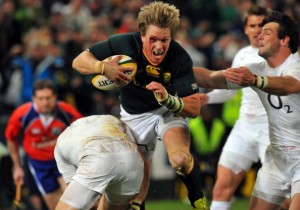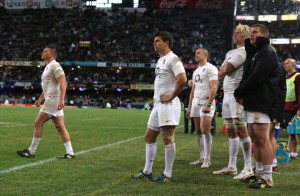By Ben Coles
SATURDAY WAS not a good 24 hours for Northern Hemisphere sides on tour, but before the evening kick-off in Durban there was still cause for England fans to be optimistic. Despite losing the first Test by a five-point margin, a great chance has, undoubtedly, gone begging. However, all is not lost as the England bandwagon rolls on to Johannesburg.
What England did well for large portions of the game was gain parity with the Springboks physically, absorbing the bullocking runs spearheaded by Bismarck du Plessis and Willem Alberts in particular, before putting in some thunderous hits of their own. It was only after the half-time whistle, and particularly in the key third quarter that the Boks practically bullied a weary England out of the game, that the match was won.
They were also sharp at the breakdown considering their lack of a traditional fetcher – seven out of South Africa’s nine penalties conceded came at the ruck area – but too often England were too eager to stop South Africa as early as possible, finding themselves offside on three occasions which were all pounced on by Morné Steyn.
Over eagerness also cost England at the scrum, where looking to grasp an early advantage they persistently conceded free kicks in the first half. A combination of nerves and adrenaline, combined with England’s lack of experience, played a significant part in their defeat but on what is a tour designed to blood England’s youth and gel their team together, defeats are not necessarily a bad thing.
In fact, a lot of what England produced on Saturday was encouraging, the attack aside (more to come on that later). Manu Tuilagi will be a far better player after his roughhouse encounter with Jean de Villiers – one all between those two when it comes to thunderous tramples over your opponent – and his try-saving tackle on Pierre Spies truly was a moment of magic. Mike Brown appeared more than capable under the raining Gilberts, Ben Foden on the wing looked comfortable, taking his try with particular aplomb, whilst debutants Joe Marler and Tom Johnson both started with a bang and were a part of a very effective lineout unit – winning 10/11. None of them were outstanding, but this tour is about development and not results. Which is where Owen Farrell comes in.
Adept as always with the boot, too often Farrell was found sending out passes that were not good enough. There is no doubting his excellence when it comes to defence and kicking, but that is the type of player that England do not need at fly-half. Mediocrity going forward plagued England at the Rugby World Cup and in Durban apart from the occasional burst from Tuilagi or surge from Foden, England simply did not produce enough opportunities.
The whole reason for Foden and Brown’s inclusion at the back was to field the inevitable barrage of Springbok kicks, but it was England who produced a range of box kicks from Ben Youngs and efforts from Brown, Farrell and even at one point, Dylan Hartley. The balance was uneven and it wasn’t until England flung the ball wide for a Foden consolation score that they showed some promise. Coincidentally this happened after Brad Barritt had left the field due to injury.
England face a dilemma over Barritt going forward. Injury has ruled him out the 2nd Test in Johannesburg – he underwent an operation for a lacerated eye in Durban on Sunday – meaning England will look for a new midfield combination. A fantastic defender, thus far in his international career he has failed to produce enough in attack. England have options at centre – Jordan Turner-Hall, George Lowe and Anthony Allen are on tour – but alternatively England could look at either Toby Flood or Jonathan Joseph.
Stuart Lancaster can either move Farrell into inside centre, or bring Tuilagi infield to second five-eighth with Joseph at 13. The combination of Tuilagi and Joseph has been whispered about for some time – the perfect balance of raw power and pace. Naturally there are question marks over whether they can produce defensively, especially against the power of the Boks, but England must be more inventive if they are to improve. The 22-17 result in the first Test was by no means embarrassing, but work remains to be done.








